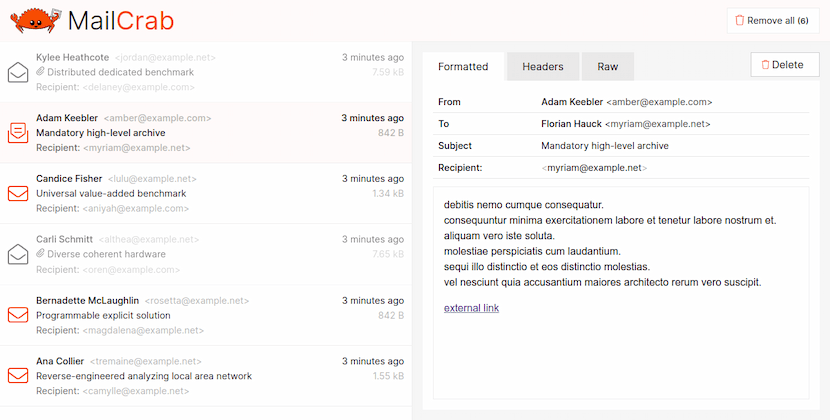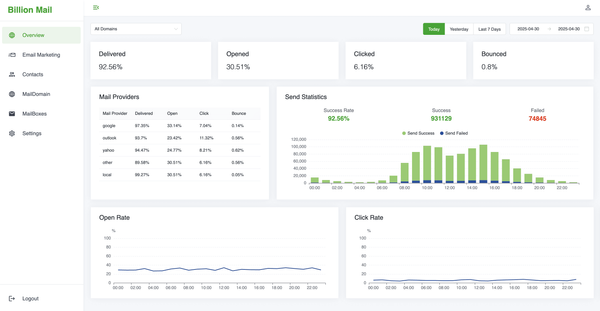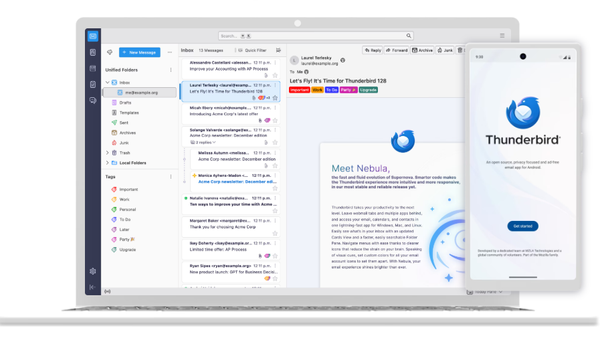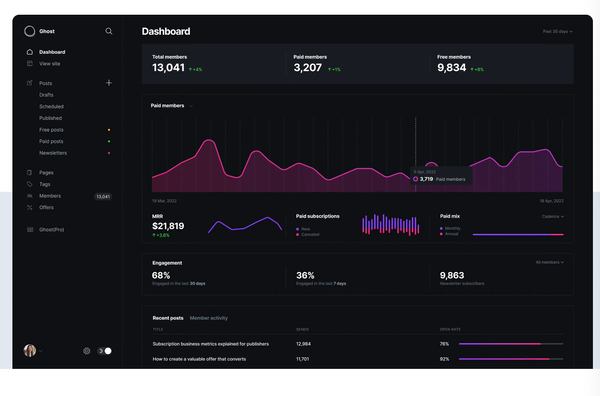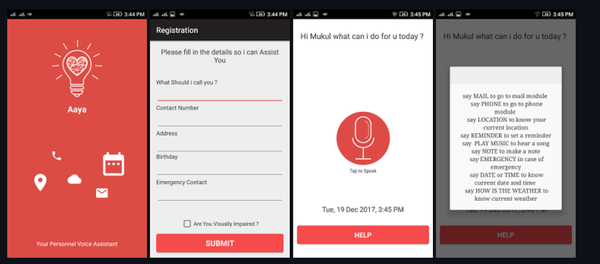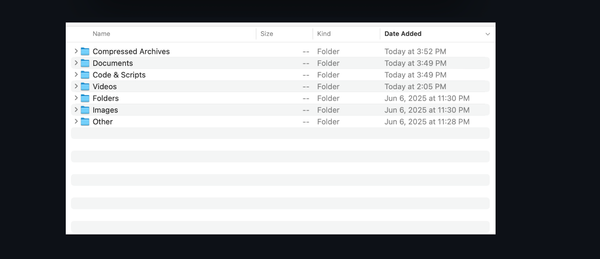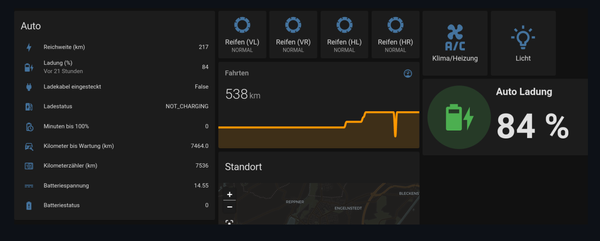Sandboxed Email Flows: Top 10 Open-Source SMTP & Email Testing and Email Sandbox Tools for Developers
Discover the essential open-source email testing tools like GreenMail, MailHog, and Papercut SMTP. Ensure flawless email flows, prevent leaks, and accelerate development. Dive into the top 10 frameworks for robust, secure applications.
Table of Content
Okay, let's dive into why email testing frameworks are a developer's secret weapon, and why choosing an open-source solution like GreenMail can be a game-changer.
Think about it: email is still one of the most critical parts of modern applications. Whether it's sending a password reset, confirming a purchase, or triggering a workflow, if that email doesn't go through, or worse, goes somewhere it shouldn't, it can break the user experience, compromise security, or just plain confuse everyone involved.
That’s where email testing frameworks come in.
Why Email Testing Frameworks Are Essential for Developers
Building an app that sends emails? You need to test that flow. But hooking up to a real SMTP server for every test is asking for trouble, slow tests, potential spam, and the very real risk of accidentally bombarding real users with test messages. Enter email testing frameworks.
These tools act like a fake mail server. Your application connects to them just like it would connect to Gmail or SendGrid, but instead of delivering emails to the outside world, they catch them, hold them, and let you inspect every single part, headers, body, attachments, everything.
This sandboxed approach is crucial for several reasons:
- Reliable & Fast Testing: No more waiting for emails to arrive or dealing with network flakiness. Tests run locally and instantly, making your test suite lightning-fast and dependable.
- Prevent Accidental Leaks: Ever sent a test email to a client by accident? Yeah, not cool. A testing framework ensures emails stay within your development or testing environment. No more red faces or awkward explanations.
- Complete Control & Inspection: Need to verify that the password reset link is correct, or that a specific header was added? These frameworks give you direct access to the entire email object, allowing for thorough assertions in your tests.
- Integration Testing: They allow you to simulate complex email-driven workflows. Did the user receive the right confirmation email and the follow-up digest? You can orchestrate and verify these multi-step processes easily.
- Development Sandboxing: Running a local development environment? Instead of configuring complex mail server setups, a simple testing framework gives you a fully functional, disposable mail server right on your machine. Perfect for debugging email templates or flows without any external dependencies.
The Power of Open Source in Email Testing
Just like the dozens of open-source applications we've covered before, the open-source landscape for email testing is rich and robust.
Why go open source here?
- Transparency & Trust: You can see exactly how the tool works, ensuring it behaves as expected and doesn't introduce hidden vulnerabilities or backdoors.
- Flexibility & Customization: Need a specific feature or behavior? With the source code, you can often tweak it to fit your exact needs or contribute improvements back to the community.
- Cost-Effective: Open-source tools are free to use, making them accessible to developers and teams of all sizes, from solo hackers to large enterprises looking to optimize costs.
- Community Driven: Active communities mean better documentation, faster bug fixes, frequent updates, and a wealth of shared knowledge and examples (like the ones you see for GreenMail).
We've explored a wide range of open-source projects, from Email OSINT tools that help investigate digital footprints, to powerful self-hosted email servers that give you complete control over your communication, to robust email clients that prioritize privacy, and even self-hosted email marketing and newsletter platforms for managing campaigns. Email testing frameworks fit perfectly into this ecosystem, providing the essential tooling needed to build and verify these systems reliably.
Whether you're developing the next big web application, contributing to an open-source email server, or crafting a custom email client, having a solid email testing strategy, powered by tools like GreenMail, isn't just helpful, it's absolutely critical.
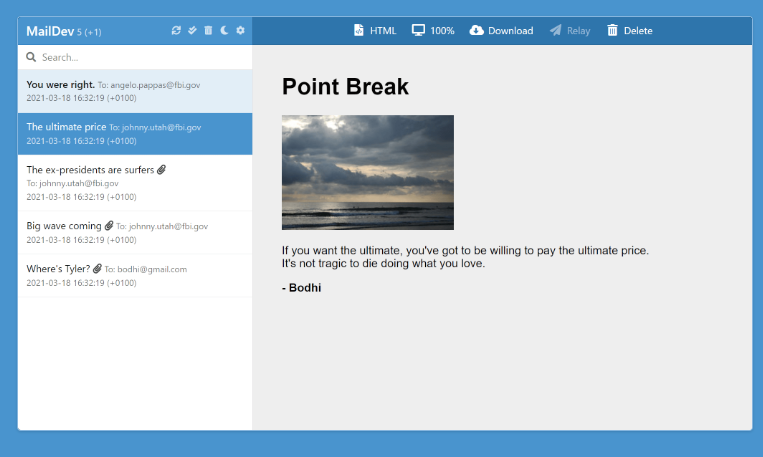
It ensures your email flows work flawlessly, protects against embarrassing mistakes, and ultimately leads to more robust, trustworthy software.
It's the unsung hero of the development toolkit, making sure your messages reach their destination, safely, correctly, and only where they're supposed to.
Email Testing Tools and Frameworks for Developers
1- MailHog
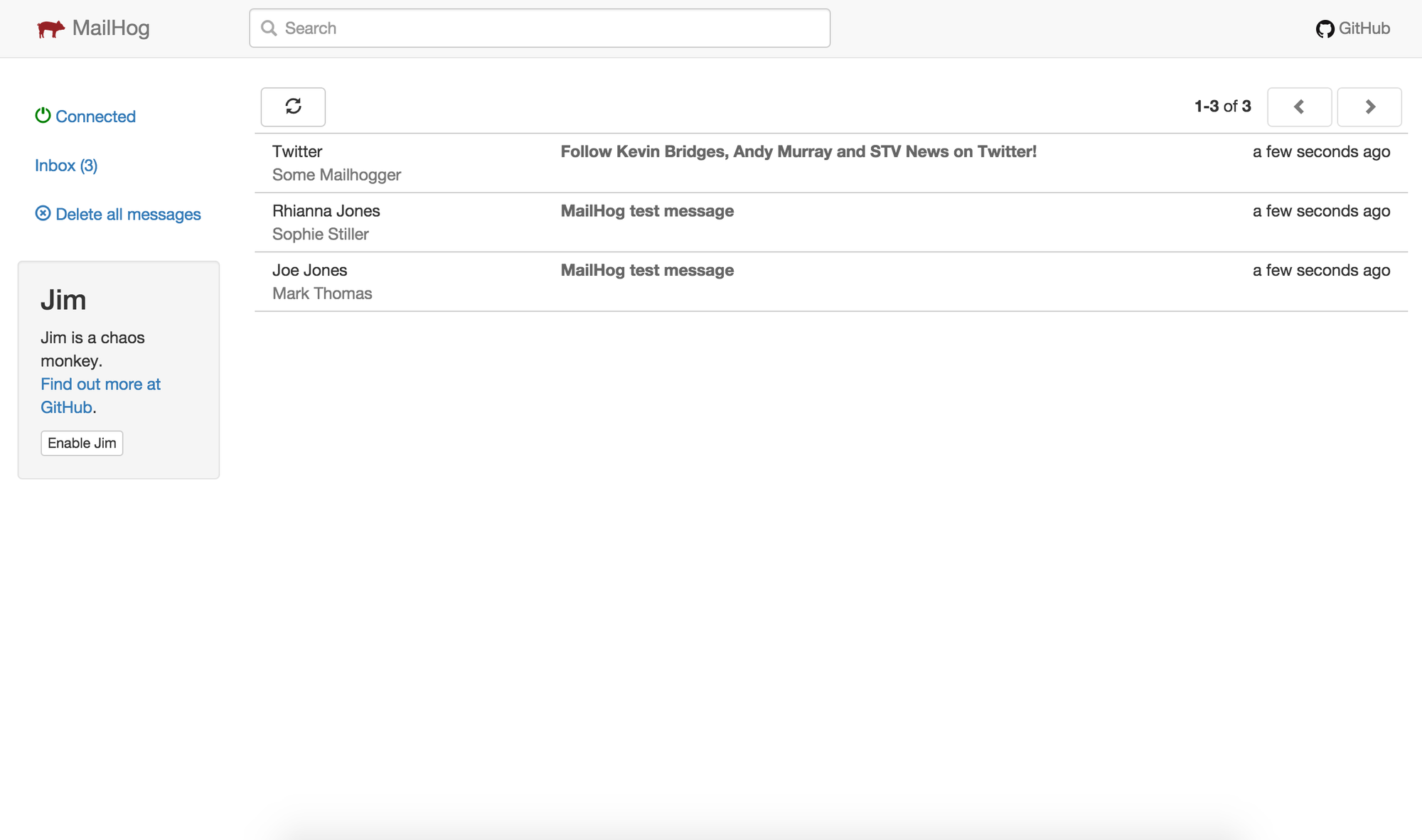
MailHog is a lightweight, cross-platform email testing tool built with Go. It catches outgoing SMTP emails from your applications, providing a simple web interface and JSON API for viewing messages.
MailHog is perfect for development and testing environments, it prevents emails from reaching real recipients while allowing optional release to actual SMTP servers.
It can be installed easily on Windows, Linux, macOS as well as using Docker.
Features
- ESMTP server implementing RFC5321
- Support for SMTP AUTH (RFC4954) and PIPELINING (RFC2920)
- Web interface to view messages (plain text, HTML or source)
- Supports RFC2047 encoded headers
- Real-time updates using EventSource
- Release messages to real SMTP servers
- Chaos Monkey for failure testing
- See Introduction to Jim for more information
- HTTP API to list, retrieve and delete messages
- See APIv1 and APIv2 documentation for more information
- HTTP basic authentication for MailHog UI and API
- Multipart MIME support
- Download individual MIME parts
- In-memory message storage
- MongoDB and file based storage for message persistence
- Lightweight and portable
- No installation required
2- GreenMail
GreenMail is an open-source email testing suite designed for developers. It simulates SMTP, POP3, and IMAP servers, providing a safe, sandboxed environment for email integration testing without risking accidental delivery to real mail servers.
Its key features include built-in TLS/SSL support, seamless embedding in JUnit tests for integration testing, and flexible deployment options as a standalone JVM process, WAR module, or Docker image, making it ideal for both development and testing workflows.

3- PMail
PMail is a personal email server that pursues a minimal deployment process and extreme resource consumption. It runs on a single file and contains complete send/receive mail service and web-side mail management functions.
Features
- Single file operation and easy deployment.
- The binary file is only 15MB and takes up less than 10M of memory during the run.
- Support dkim, spf checksum, Email Test score 10 points if correctly configured.
- Implementing the ACME protocol, the program will automatically obtain and update Let's Encrypt certificates.
- Support pop3, smtp protocol, you can use any mail client you like.
- Support multi-domain, multi-user and complete support for sending and receiving e-mail.
4- Papercut SMTP
Papercut SMTP is a lightweight, Windows-based email testing tool that combines a built-in SMTP server with a desktop email viewer.
It catches all outgoing emails during development, preventing accidental delivery to real recipients while providing instant access to view complete email content including body, HTML, headers, and attachments.
It is great for developers who want a simple, always-ready solution for safe email testing without the overhead of configuring external mail servers.
5- MailDev
MailDev is a simple way to test your project's generated email during development, with an easy to use web interface that runs on your machine built on top of Node.js.
Developers can easily install it with Docker, using the following command:
$ docker run -p 1080:1080 -p 1025:1025 maildev/maildev6- smtp4dev
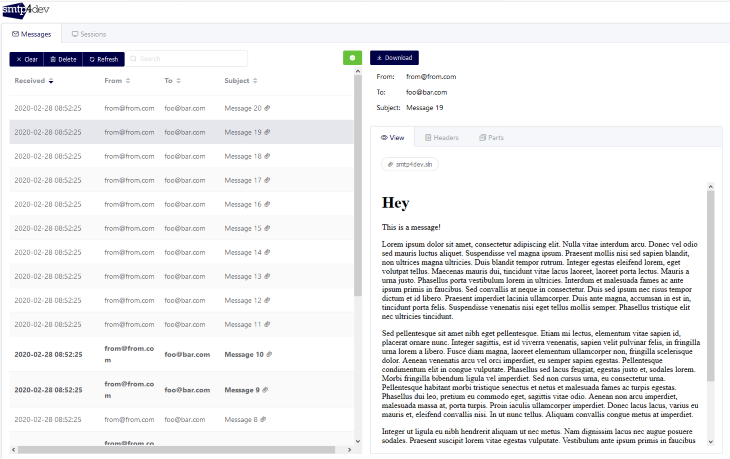
smtp4dev - the fake SMTP email server for development and testing. In the nutshell, it is a dummy SMTP server for Windows, Linux, macOS (and maybe elsewhere where .NET Core is available).
Features
- OpenAPI/Swagger API
- IMAP access to retrieve and delete messages
- SMTP session logging
- UTF8 support
- Viewport size switcher to simulate mobile etc
- Multipart MIME inspector
- HTML compatibility report and HTML validation
- TLS/SSL with implicit and STARTTLS modes and auto self-signed cert generation
- Authentication
- Multiple mailboxes along with rules to control what message goes where
- Reply, compose and relay messages including rules to auto relay
- Scripting expressions including error simulation
7- MailCrab

This is a tiny email test server for development, written in Rust.
Features
- Accept-all SMTP server
- Web interface to view and inspect all incoming email
- View formatted mail, download attachments, view headers or the complete raw mail contents
- Single binary
- Runs on all
amd64andarm64platforms using docker - Just a 7.77 MB docker image
8- Mox
Mox is a modern full-featured open source secure mail server for low-maintenance self-hosted email. It can be used for testing email workflow to make sure your app is secure.
Mox Local Serve's Features
- Quick and easy to start/maintain mail server, for your own domain(s).
- SMTP (with extensions) for receiving, submitting and delivering email.
- IMAP4 (with extensions) for giving email clients access to email.
- Webmail for reading/sending email from the browser.
- SPF/DKIM/DMARC for authenticating messages/delivery, also DMARC aggregate reports.
- Reputation tracking, learning (per user) host-, domain- and sender address-based reputation from (Non-)Junk email classification.
- Bayesian spam filtering that learns (per user) from (Non-)Junk email.
- Slowing down senders with no/low reputation or questionable email content (similar to greylisting). Rejected emails are stored in a mailbox called Rejects for a short period, helping with misclassified legitimate synchronous signup/login/transactional emails.
- Internationalized email (EIA), with unicode in email address usernames ("localparts"), and in domain names (IDNA).
- Automatic TLS with ACME, for use with Let's Encrypt and other CA's.
- DANE and MTA-STS for inbound and outbound delivery over SMTP with STARTTLS, including REQUIRETLS and with incoming/outgoing TLSRPT reporting.
- Web admin interface that helps you set up your domains, accounts and list aliases (instructions to create DNS records, configure SPF/DKIM/DMARC/TLSRPT/MTA-STS), for status information, and modifying the configuration file.
- Account autodiscovery (with SRV records, Microsoft-style, Thunderbird-style, and Apple device management profiles) for easy account setup (though client support is limited).
- Webserver with serving static files and forwarding requests (reverse proxy), so port 443 can also be used to serve websites.
- Simple HTTP/JSON API for sending transaction email and receiving delivery events and incoming messages (webapi and webhooks).
- Prometheus metrics and structured logging for operational insight.
- "mox localserve" subcommand for running mox locally for email-related testing/developing, including pedantic mode.
- Most non-server Go packages mox consists of are written to be reusable.
9- Mail-Dev
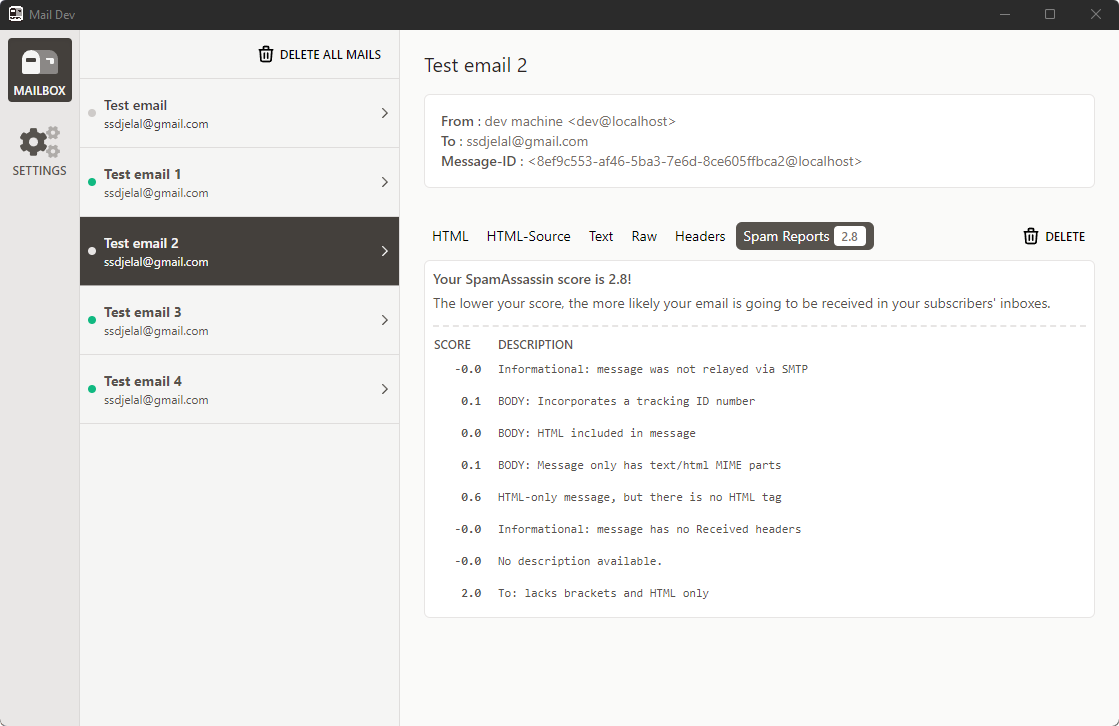
This is a self-hosted free and open-source Local SMTP Server For Email Testing/Debugging. it is built on top of React and Tauri frameworks.
Features
- Custom SMTP server port
- Frameworks configuration snippets
- Attachment support
- Forward emails
- Notification
10- Mini Mail Dev
This is a free and open-source application that provides an alternative approach to development and testing email servers.
Features
- Get started with a single command
- Simple UI
- Fast
- Can handle a vast amounts of emails
To run it, all you need to do is running the following command:
docker run -it --rm -p 1080:1080 -p 1025:1025 ghcr.io/mjarkk/mini-mail-dev:latestChoosing the right email testing framework is no longer a luxury—it's a necessity for building reliable, secure applications. As highlighted throughout this discussion, tools like GreenMail, MailHog, Papercut SMTP, and others offer developers a sandboxed environment to simulate real-world email interactions without the risks associated with live SMTP servers.
The core benefits are clear: dramatically faster and more reliable testing, complete prevention of accidental email leaks, granular inspection of email components for thorough validation, and seamless integration into development workflows.
Whether you're running unit tests with JUnit, developing locally with a fake SMTP server, or deploying a temporary solution for complex integration testing, these open-source frameworks provide the flexibility and control needed.
The open-source nature of these tools adds significant value, offering transparency, cost-effectiveness, and the power of community-driven development. From lightweight desktop solutions to full-featured server suites supporting SMTP, POP3, and IMAP, the landscape is rich and varied.
This ensures that whether you're a solo developer working on a small project or part of a large team building complex systems (including those involving email servers, clients, or marketing automation we've previously covered), there's a robust, open-source email testing solution perfectly suited to streamline your workflow and guarantee the integrity of your email functionalities.
Embracing these tools isn't just smart—it's critical for delivering high-quality software.

